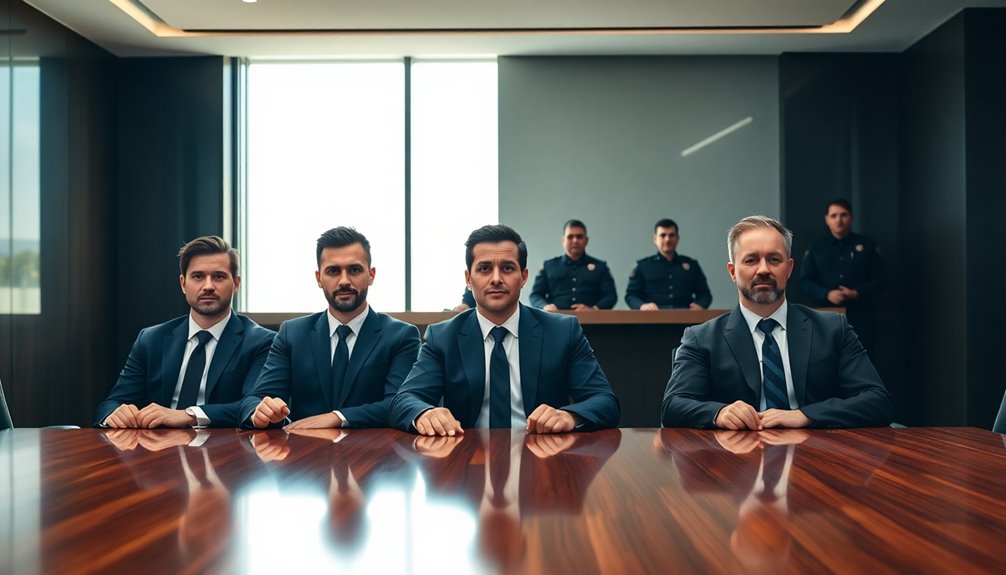Mastering the perfect interview greeting is essential for making a lasting first impression. When you greet your interviewer, stand up, smile, and maintain eye contact. A firm handshake conveys confidence and professionalism. Introduce yourself clearly, using appropriate titles. If it's a panel interview, wait for introductions and greet each member by name. Remember to keep an open posture and avoid distractions while waiting. These simple steps not only help establish rapport but also set a positive tone for the conversation ahead. To uncover more insights on effective greetings and interview dynamics, keep exploring the topic.
Key Takeaways
- Stand up, smile, and maintain eye contact to convey confidence and professionalism when greeting interviewers.
- Use a firm handshake to establish trust and assertiveness during the introduction.
- Clearly introduce yourself using polite and formal language, addressing the interviewer by their title.
- In panel interviews, wait for introductions and greet each member by name to foster rapport.
- Maintain positive body language and avoid distractions in the waiting area to set a professional tone.
Importance of Interview Greeting

You mightn't realize it, but the way you greet your interviewer can greatly impact their first impression of you. First impressions form within seconds, and a strong greeting reflects your professionalism and etiquette.
When you enter the room, your greeting communicates trustworthiness and suitability for the role. It sets the tone for the entire interview, influencing how the interviewer perceives you.
Both verbal and non-verbal communication play an essential role here; your tone, body language, and even your smile leave lasting impressions. By mastering your greeting, you establish a positive atmosphere that encourages engagement and rapport.
How to Greet Interviewers

A confident and courteous greeting can make all the difference when meeting interviewers. Start by standing up, smiling, and making eye contact as you approach. Use a firm handshake to convey confidence, and introduce yourself clearly.
It's important to maintain polite and formal language throughout your greeting. If you're meeting a panel, wait for their introductions and greet each member by name to build rapport.
Be mindful of your body language; an open posture shows engagement. Mirroring the interviewers' demeanor can also help create a comfortable atmosphere.
Interview Greeting Scenarios

Maneuvering various interview greeting scenarios can greatly impact your overall impression. Each situation requires you to adapt your approach for success.
Here are four common scenarios to keep in mind:
- At Reception: Politely introduce yourself and mention your appointment details to establish professionalism.
- In Waiting Room: Stay positive with open body language; avoid distractions like your phone to convey focus.
- Greeting Interviewer: Smile, stand up, introduce yourself, and offer a firm handshake to exude confidence.
- Greeting Interview Panel: Wait for introductions, then greet each member by name to show respect and engagement.
Adjusting your greetings in these scenarios sets a solid foundation for a successful interview.
Tips for Specific Situations

Effective greetings in specific situations can greatly enhance your interview experience. At the reception, greet the receptionist formally and clarify your appointment details.
In the waiting room, maintain an open posture and avoid distractions like your phone.
When greeting your interviewer, remember to smile, stand up, and introduce yourself using their title.
For panel interviews, wait for introductions and address each member by name to show respect and engagement.
During a phone interview, choose a quiet location and answer with a friendly tone, introducing yourself clearly. Smiling while speaking can help convey positivity, even over the phone.
Related Articles and Resources

In your journey to master interview greetings, exploring related articles and resources can provide valuable insights and enhance your preparation. Here are some resources you should consider:
- Steps of the Interview Process: Familiarize yourself with the various stages of interviews to feel more confident.
- Guide to In-Person Interviews: Gain tips on how to prepare effectively for face-to-face meetings.
- Interviewee vs. Interviewer: Understand the distinct roles and expectations of both parties to navigate interactions smoothly.
- Career Development Articles: Immerse yourself in broader topics on skills improvement and job market insights that can elevate your overall interview performance.
Incorporating time management skills into your preparation can significantly enhance your efficiency in rehearsing and organizing your thoughts.
Utilizing these resources can help you refine your approach and increase your chances of making a memorable first impression.
Frequently Asked Questions
What Should I Wear for an Interview Greeting?
When you're deciding what to wear for an interview greeting, think about professionalism and the company culture.
Opt for business attire, like a suit or dress with polished shoes. Make sure your clothes are clean and well-fitted.
Avoid overly casual items, like jeans or sneakers. Accessories should be minimal and tasteful.
Dressing appropriately not only boosts your confidence but also helps create a positive first impression with your interviewer.
How Early Should I Arrive for an Interview?
You might think arriving too early could be awkward, but showing up 10 to 15 minutes ahead of your interview is actually ideal.
This gives you time to relax and gather your thoughts. Plus, it shows your punctuality and respect for the interviewer's time.
Just avoid lingering in the waiting area for too long, as that can create unnecessary tension.
Arriving at the right time sets a positive tone for your interview.
Can I Greet Interviewers With a Hug?
While it might feel natural to greet someone with a hug, you should avoid doing so in a professional interview setting.
Not everyone is comfortable with physical contact, and a handshake is the standard greeting. It communicates professionalism and respect.
Stick to a firm handshake, maintain eye contact, and smile. This way, you'll set a positive tone while ensuring you respect the interviewer's personal boundaries from the start.
What if the Interviewer Doesn't Extend a Handshake?
If the interviewer doesn't extend a handshake, don't worry. Instead, you can smile and greet them warmly with a polite verbal introduction.
It's important to stay composed and adapt to their comfort level. You might say, "It's great to meet you," while maintaining eye contact and open body language.
This approach shows professionalism and respect, helping you create a positive atmosphere for the rest of the interview.
Should I Follow up After the Greeting?
Think of your greeting as the opening note of a mesmerizing symphony; it sets the stage for what follows.
Yes, you should absolutely follow up after the greeting. A simple, "It's great to meet you," or a compliment about the office can break the ice.
This small gesture builds rapport and shows your enthusiasm.
Just remember, every word counts in this performance, so keep it genuine and engaging!
Conclusion
In the world of interviews, a strong greeting is your golden ticket to making a memorable first impression. By mastering the art of greeting, you pave the way for a smooth conversation that showcases your professionalism and confidence. Remember, it's not just what you say, but how you say it. With a warm smile and a firm handshake, you can turn that brief moment into a powerful connection, setting the stage for success in your interview journey.









